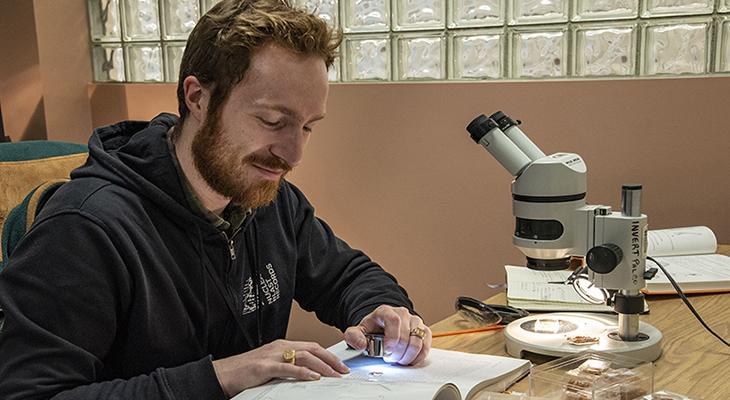Alfred Lemierre studies the anatomy and ecologies of fossil amphibians (frogs and salamanders), lizards, and snakes. He is particularly interested in frogs from western North America and their evolution during the Cretaceous/Palaeogene transition. His research seeks to understand how the ecological diversity of frogs (e.g., body size, diet, locomotion) changed across the large climate and environmental shifts at the Cretaceous/Palaeogene transition, and how frogs survived where larger vertebrates did not. Alfred also studies the anatomy, systematics, and diversity of amphibians, lizards, and snakes from the Palaeogene of southern France.
Research Interests
- Fossil frogs from the Cretaceous and Palaeogene of North America.
- Fossil amphibians (frogs, salamanders), lizards, and snakes from the Quercy Phosphorites (Palaeogene, southwestern France).
- Fossil amphibians from the Neogene of France and southern Africa.
- Fossil frogs from the Cretaceous of Africa.
Professional Highlights
- Participated in fieldwork and research projects in Quercy Phosphorites involving multiple research labs across France.
- Published the description of an exceptional frog mummy from the Eocene of France.
- Collaborator on a Franco-South African research project on the Neogene and Pleistocene localities of South Africa (Bolt’s Farm, Cradle of Humankind), Namibia, Uganda, and Kenya.
- Collaborator on numerous studies on fossil amphibians and lizards from Europe, Africa, and North America.
Education
- Ph.D., Museum National d’Histoire Naturelle, 2022
- M.Sc., Sorbonne University, 2018
- B.Sc., Sorbonne University, 2016

- Research Publications
Perthuis, A. de, Mennecart, B., Barrier, P., Chenot, É., Falconnet, J., Gagnaison, J.-C., Georgalis, G.L., Gilbert, C., Guevel, B., Langevin, D., Lapparent de Broin, F. de, Lemierre, A., Maubert, F., Ossó, À., Potel, S., Thivaiou, D., Tissier, J., Toullec, R., Xerri, S., and Gagnaison, C. (In press.) Révision des données sédimentologiques et biostratigraphiques des gisements à vertébrés des sables de l’Orléanais, à Beaugency, Tavers et Le Bardon (Miocène Moyen ; Loiret, France). Geodiversitas.
Lemierre, A., Bailon, S., Folie, A., and Laurin M. (In press.) New pipimorphs from the Late Cretaceous of Niger. Annales de Paléontologie.
Lemierre, A., Vilakazi, N., Gommery, D., and Kgasi, L. 2024. Unveiling the first neobatrachian (anura) discovered in the paleokarst system of Bolt’s Farm (Plio-Pleistocene; Cradle of Humankind), South Africa. African Journal of Herpetology, 73(2), 166 – 184. https://doi.org/10.1080/21564574.2024.2351821
Mayr, G., Göhlich, U.B., Roček, Z., Lemierre, A., Winkler, V., and Georgalis, G.L. 2023. Reinterpretation of tuberculate cervical vertebrae of Eocene birds as an exceptional anti-predator adaptation against the mammalian craniocervical killing bite. Journal of Anatomy, 244(3), 402 – 410. https://doi.org/10.1111/joa.13980
Lemierre, A., Bailon, S., Folie, A., and Laurin, M. 2023. A new pipid from the Cretaceous of Africa (In Becetén, Niger) and early evolution of the Pipidae. Journal of Systematic Palaeontology, 21(1), 2266428. https://doi.org/10.1080/14772019.2023.2266428
Lemierre, A., Gendry, D., Poirier, M.-M., Gillet, V., and Vullo, R. 2022. The oldest articulated ranid from Europe: A Pelophylax specimen from the lowest Oligocene of Chartres-de-Bretagne (NW France). Journal of Vertebrate Paleontology, 42(4), e2191663. https://doi.org/10.1080/02724634.2023.2191663
Lemierre, A., and Blackburn, D. 2022. A new genus and species of frog from the Kem Kem (Morocco), the second neobatrachian from Cretaceous Africa. PeerJ, 10, e13699. https://doi.org/10.7717/peerj.13699
Lemierre, A., and Laurin, M. 2022. Le retour des momies, In S. Chabonnier & P. De Wever (eds.), Paléontologie d'aujourd'hui (148 – 149). Les Ulis, France: Edp Sciences.
Lemierre, A., and Laurin, M. 2021. Conversion of the names Pyxicephaloidea, Pyxicephalidae and Pyxicephalinae (Anura, Ranoidea) into phylogenetic nomenclature. Bionomina, 25(1), 81 – 92. https://dx.doi.org/10.11646/bionomina.25.1.7
Lemierre, A., Folie, A., Bailon, S., Robin, N., and Laurin, M. 2021. From toad to frog, a CT-based reconsideration of the mummified holotype of Bufo servatus, an Eocene anuran from Quercy (France). Journal of Vertebrate Paleontology, 41(3), e1989694. https://doi.org/10.1080/02724634.2021.1989694
